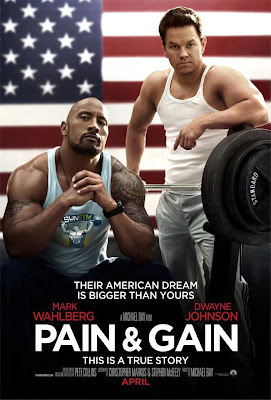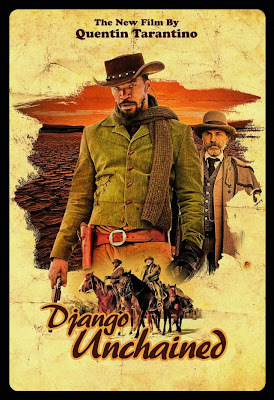‘Lincoln’ Finds Courage In Its Craft And Focus
Lincoln: 4 out of 5
Abraham Lincoln: Do we choose to be born? Or do we fit into the times where born into?
Lincoln is a film that has been a long time
coming. I remember hearing about early stories of director Steven
Spielberg working on getting a movie made about Abraham Lincoln, with Tom Hanks
being rumored for the role. Then things became more official, as Liam
Neeson was said to be attached. The time passed, Neeson bowed out, only
to have Daniel Day-Lewis jump in, bringing his intense, method actor ways to
Spielberg’s period drama. This worked out for the better, I suppose, as
Day-Lewis appears to be embodying the Great Emancipator, but in less an
overpowering way, as past portrayals have implied, but in an authoritative, yet
kind manner. Similarly, Lincoln, as a whole, is not an
overpowering biopic, but a drama focused on a very specific period in the 16th
President’s life. The results are quite good, as everyone involved has
worked to achieve an incredibly cinematic, well-acted, drama that respects the
material, if just a bit too much.
The film
takes place in January, 1865, and focuses on the final four months of President
Abraham Lincoln’s life. The Civil War is nearing its end and Lincoln
(Daniel Day-Lewis) has just entered into his second term in office. In
order to both assure a victory for the Union and do what he believes is right,
Lincoln is now focused on getting all the votes he needs in the House of
Representatives to pass the Thirteenth Amendment in the Constitution, which
would abolish slavery for good. That’s really all the story there is to
tell, but if features a large number of characters played by an assortment of
different recognizable actors.
Sally
Field is First Lady Mary Todd Lincoln, who is in support of her husband on a
political and personal level, but finds issue elsewhere regarding the decision
made by her son, Robert Todd Lincoln (Joseph Gordon-Levitt), who is eager to
join in the war effort, having completed his work in college. Tommy Lee
Jones is Thaddeus Stevens, a radical abolitionist, who is incredibly proud of
his attitude for equal rights. David Strathairn is Secretary of State
William Seward, a man Lincoln can confide in, during this controversial
time. Jared Harris is Lieutenant General Ulysses S. Grant, who continues
to command the Union Army. And there are a ton more roles filled by
actors such as James Spader, Hal Holbrook, Tim Blake Nelson, David Oyelowo,
Bruce McGill, Lee Pace, and Jackie Earle Haley. A month back, I joked
that any character actor who was not in Argo is in Lincoln, but
that seems to basically be true, as these two period dramas are the ones that
everyone apparently fought to be in.
Fortunately,
by having all of these actors, there is a nice sense of gravitas that
accompanies this film. It is not that Lincoln, a film from
director Steven Spielberg, about one of the most well-known figures in history,
necessarily needs additional gravitas, but it seems like there is just a level
of comfort in having some many recognizable faces in a film that is all about
the behind-the-scenes struggles politicians faced during a very volatile
time. That said, it does not get much more comfortable than seeing Daniel
Day-Lewis acting out “Story Time with Lincoln”, as the film mixes its West
Wing-like dialogue battles with long monologues from the
Commander-In-Chief.
The script
by Tony Kushner, which is based in part on the novel “Team of Rivals” by Doris
Kearns Goodwin, manages to be really engaging, when it is at its best.
Watching sequences of respectable men (as well as some unrespectable persons
and some women) argue and overlap with their dialogue makes for a film that
feels less stuffy than the assumed nature of a film of this caliber would
imply. When dealing with Lincoln, if the film is not having him get into
spirited battles against others, it takes its time to pause and let Lincoln
recount some old story that he remembers and somehow connects to the
situation. It is due to what Day-Lewis and Spielberg bring to these
scenes that the film does not fare worse because of these monologues, as it
does get repetitive, even after a character literally points this very subject
out loud in the film. Fortunately, along with these scenes and the
already mentioned scenes of banter, the film has a humorous touch (true to
Spielberg form), which keeps things lively as well.
Performance-wise,
stepping back from addressing every person in the movie, a few key characters
come to mind as the most significant. Day-Lewis is unsurprisingly great
in the film, going for a more historically correct version of Lincoln (more
introverted and with a higher-pitch voice than people assume is the case),
which allows him to distance himself from his more broad (and incredibly
entertaining) performance as Daniel Plainview in There Will Be Blood.
Lincoln has this great level of charisma, which Day-Lewis is able to pull off
quite well, without going too far and coming off as a caricature. In an
equally entertaining performance, Tommy Lee Jones is pretty fantastic in this
film. He has one scene, which basically requires him to swallow his pride
and tell his opposition to go hell, which is just one of the best parts of the
film. His wig may look silly (it’s true to life), but Jones is great
here. I was also a big fan of what David Strathairn brought to the film,
as he basically kept the film anchored in a level of reality, preventing it
from taking off into overly-sentimental territory, not to mention how he was a
through line in a number of significant and effective conversations.
If the
film suffers anywhere in particular, it is due to its desire to stuff in more
conflict that did not necessarily need to be included and could have made for a
tighter picture overall. As much as I enjoy Joseph Gordon-Levitt (who is
already having an amazing year), less involvement with his character could have
lent itself to a more focused feature overall. This is just one aspect,
but the film is, of course, long, which is not surprising, but seems unsure of
why it needs to be. There is a solid framework for a movie here, with a
very specific plot thread to work with, but it feels more like Spielberg needed
to add some additional aspects simply to have his ground covered on the one
Lincoln film that he gets to make. It comes as no surprise that the
ending of the film is where one would assume it would be in a biopic, as
opposed to logical spots in the film, which could have been just as good, as
Spielberg continues to have issues with what is best as a finale in this era of
his career.
Back on
the positive side though, it certainly comes as no surprise that the technical
aspects of this film are fantastic. The period detail seen throughout is
gorgeous, with great production and costume design, shown off wonderfully by
Spielberg’s longtime cinematographer Janusz Kaminski. There is even a
portion of the film that shows off some of battle going on during the Civil War
and other moments of the brutality that it caused, which does not necessarily
make me want to see a full blown Civil War movie, but makes me satisfied with the
film giving us one reason for wanting to see Lincoln inevitably succeed in his
cause. As an additional note, Lincoln has now also usurped the
throne from True Grit as the best beard movie in years.
I want to
end by addressing my favorite scene of the film, which is actually near the
beginning. Following the battle scene, we are introduced to Lincoln, via
two black soldiers discussing their pay versus the pay that goes to white
soldiers. The dialogue is wonderfully written and the attitude of Lincoln
is perfect, as he delivers his first of many monologues. There is some
subtext here as well, as we get a first glance at how the film is coming down
on certain issues and how Lincoln (and those who will battle with him) is going
to have to stretch the limits of what is true and what matters in order to get
a point across. Lincoln is not about the story of Abraham Lincoln
as a whole, it is more focused and intimate, despite the multitude of
characters present, and it is very well-acted and crafted. Spielberg
manages to reign in the more syrupy aspects last seen in War Horse
(which I really liked as well) and create a strong film about a man putting
about the deserved end of a long struggle against something immoral. In doing so, he gets away from making the
film feel too self-important and gets to the heart of a man during a specific
and important moment in his life.
Abraham Lincoln: This settles the fate for all coming time. Not only of the millions now in bondage, but of unborn millions to come. Shall we stop this bleeding?
Aaron
is a writer/reviewer for WhySoBlu.com.
Follow him on Twitter @AaronsPS3.
He also co-hosts a podcast, Out Now with Aaron and Abe, available via iTunes or at HHWLOD.com.
He also co-hosts a podcast, Out Now with Aaron and Abe, available via iTunes or at HHWLOD.com.











Comments
Post a Comment